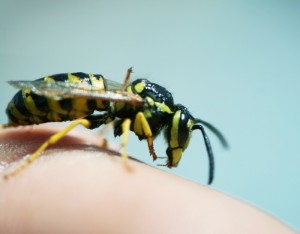 3% of adults and 1% of children have severe allergic reactions to venom. Many never tell their physicians unless prompted. There are 40 deaths from venom reactions each year. Any patient with a history of anaphylaxis and anyone over the age of 16 y/o with a generalized skin reaction (generalized hives or swelling) should be referred to an allergist for venom evaluation and prescribed epinephrine.
3% of adults and 1% of children have severe allergic reactions to venom. Many never tell their physicians unless prompted. There are 40 deaths from venom reactions each year. Any patient with a history of anaphylaxis and anyone over the age of 16 y/o with a generalized skin reaction (generalized hives or swelling) should be referred to an allergist for venom evaluation and prescribed epinephrine.
A patient does not have to have a serious reaction to every sting and can still be at risk to a life threatening reaction to a future sting and reactions can occur decades later. Adults are more prone to life threatening reactions including anaphylaxis and cardiac complications.
The most common venom to cause reactions in this area is yellow jacket which tends to reside at picnics, around open food, and trash cans especially in the fall when food is more limited. Children running around outside without shoes, those gardening and working around flowers, and bee keepers are more prone to honeybee stings.
A Board Certified Allergist can combine a detailed history with skin testing and blood tests to diagnose venom allergy. Immunotherapy is 95-100% effective in preventing anaphylaxis.- change to “with skin and blood test results”
Patients are often fearful that venom testing and immunotherapy is equivalent to a sting. However, immunotherapy starts at very low concentrations increased on a weekly basis over 10 weeks
The maintenance dose of immunotherapy is equivalent to approximately 2 honey bee stings and 2-20 yellow jacket stings. Venom immunotherapy can often be stopped in patients after 5 years except those with a very severe reaction history. Patients must always carry epinephrine. However, a subsequent reaction after reaching maintenance immunotherapy, is often less severe.
Dr. Simpson, a Board Certified Allergist can combine the findings from your history and test results to customize an individualized treatment plan.


